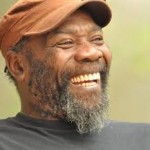Roots reggae legend Clinton Fearon has had the good fortune of living a life devoted to music. A career that has now lasted almost a half century.
On the phone from Seattle, Fearon talks about how his early years growing up in the country created a foundation of positivity, through a connection with nature, that has permeated the majority of his compositions.
“You know, I grew up in the woods man. In the country. In a little district called Mendez, way in the bush. A simple life. Often time no shirt on. Pick fruit, eat this, eat that. You know, really close to nature.”
A country boy from St. Catherine Jamaica, Fearon moved to the city of Kingston when he was a teenager. A cultural shock for a young man stepping out of a “backabush” country childhood and landing smack dab into Jamaica’s notorious concrete jungle.
His passion for music became Fearon’s guiding light, and like many aspiring musicians from meager circumstances, Fearon would go to work collecting materials to fashion his own instrument.
Regardless of what sounds like an ideal country upbringing, Fearon admits that he made a clear choice to avoid getting involved in the urban crime that has long plagued the city of Kingston.

“I’ve experienced a rough life still. I remember in Kingston, in the 1970’s, when the politics was hot. No food, youth and youth killing off one another. I could have easily gone there too. Incarceration and so on. But for the love of music, and the love of life, I decided to stick to the music.”
And it was this passion for his guitar that got Fearon noticed in 1969 by Errol Grandisson, a member of the now legendary roots reggae band The Gladiators.
Grandisson had encountered Fearon playing guitar in his yard and convinced the young construction worker to come join the band.
For his role in The Gladiators, Fearon provided vocal harmonies and went on to compose many songs for the group. He also held down the bass duties, which earned the young musician the nickname “Bassie”.
Fearon spent 18 years with The Gladiators, and over time, worked with such reggae heavyweights as Ansel Collins, Sly Dunbar and many of the major players now considered pioneers and veterans of the genre.
In those early days in Jamaica, Fearon also became a notable bassist for hire with many of the Kingston recording studios competing for the charts and sound system audiences.
In addition to recording 15 albums with The Gladiators, Fearon has collaborated with many of the most notorious reggae producers operating during reggae’s formative years. Most notably, Channel One’s Joe Gibbs, Coxone Dodd from Studio One, Duke Reid at Treasure Isle, and the prolific mad man Lee “Scratch” Perry, among others.
After spending almost 20 years establishing a solid foundation in Jamaican reggae music history and touring the world with The Gladiators, Fearon decided to lay down fresh roots in Seattle at the end of The Gladiators’ 1987 American tour.
Once established in the Pacific Northwest, Fearon first put together a band called The Defenders, which he worked with until 1993, when he then dissolved the group and formed a new backing band called The Boogie Brown Band.
Since that time Fearon has gone on to record eight albums with The Boogie Brown Band, including last year’s dazzling Goodness. A recording that pulsates with social consciousness and Fearon’s contagious optimism.
“There is a goodness inside of us, and when it is working, it is so beautiful”, He exclaims with a warmth that is truly genuine.
In recent years Fearon also decided to adopt a stripped down sound on two additional releases. With his 2005 solo acoustic release Mi An Mi Guitar, and on Heart and Soul (2012), a record that revisits some of his old Gladiators compositions, once again, in a bare bones unplugged style.
Fearon credits the original idea to showcase some of his compositions in an acoustic style to late Vancouver Island reggae promoter Brian Delisle.
“I remember long time ago him said Clinton, why don’t you take them Gladiators songs that you did and go out there as a lone Gladiator, you know, and even maybe do it acoustic.”
But it wasn’t until years later, after members of his band also began encouraging the acoustic album concept, did the “idea get thicker and thicker” in Fearon’s mind.
Since the release of Mi An Mi Guitar, Fearon has been dividing up his touring schedule between annual performances with his band at some of Europe’s most prestigious reggae and world music festivals and small intimate acoustic dates in small communities here on the west coast.
You can catch Clinton “Bassie” Fearon live at the Little Red Church in Comox on Saturday October 10th.
Doors open at 8 p.m. Tickets at Bop City Records and at the door.
Considered by local Vancouver Island reggae fans as a mystical musical experience that truly demonstrates the craftsmanship of Fearon’s inspiring songwriting, these intimate acoustic performances by this legendary roots reggae ambassador are not to be missed.
Addressing the power and positivity attributed to his songwriting and the spell his songs cast over audiences, particularly in an intimate environment, Fearon confesses his mandate.
“I think we all have the capacity to go for the positive rather than the negative. So, why not help it along?”





You must log in to post a comment.